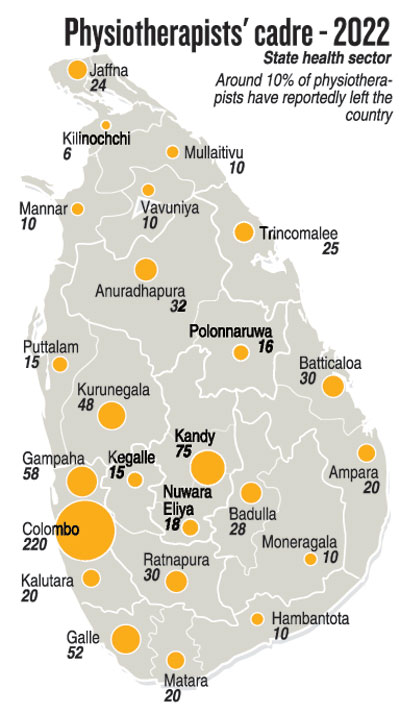News
Beware, quack physios on the loose
View(s):- Urgent warning by Sri Lanka Society for Physiotherapy over mushrooming substandard institutes and accreditation issues
By Kumudini Hettiarachchi
Quack physiotherapists who would do irreparable harm than good to patients are giving major pains to the Sri Lanka Society of Physiotherapy.
While like all health sector related fields, physiotherapy an allied health profession, is facing unprecedented challenges brought on by the severe economic crisis, other issues are aggravating matters, the Sunday Times learns.
“We too have similar but at the same time different issues,” says the Secretary of the Sri Lanka Society of Physiotherapy, Rasika L. Jayakody, covering common ground first such as the exodus of qualified physiotherapists from the country and a dearth of these vital personnel in state hospitals.(See graphic)
The Sri Lanka Society of Physiotherapy has a membership of over 450, it is understood. These personnel are indispensable whenever a person faces a debilitating illness or injury, working closely with the patient in a holistic (whole-body) approach to help manage pain, balance, mobility and motor function.
Mr. Jayakody cites some of the numerous areas in which there could be physiotherapy interventions – orthopaedic; respiratory, cardiovascular; neurological; paediatric; sports; and geriatrics.
Raising a red flag of warning, Mr. Jayakody talks at length about education in physiotherapy which has a direct impact on patient welfare. Warning against the proliferation of substandard and unaccredited institutes, he says that these are mushrooming at will and brazenly offering Diplomas in Physiotherapy. There is an urgent need to strengthen regulatory mechanisms and accreditation processes, while also partnering with international organisations to ensure that local physiotherapy educational programmes are on par with global standards.
Currently, the right way to acquire skills in physiotherapy which is in demand not only in Sri Lanka but across the world, he says, is to undergo a degree programme at the Universities of Colombo or Peradeniya or the Kotelawala Defence University (KDU) which ensures training under experts in this field in a hospital setting. Once a person secures a degree, registration with the Sri Lanka Medical Council (SLMC) is mandatory before dealing with patients. 
“There are masseurs who have got important postings with the likes of the Sports Ministry who work in the guise of physiotherapists but are unqualified. This is a dangerous trend,” says Mr. Jayakody, giving an example of such ‘pretenders’ not even knowing the structure of the human body including the location of nerves and blood vessels.They get to pay home visits through word-of-mouth and engage in much private practice.
While urging the Health Ministry to speed up the introduction of the Parliamentary Act on the Sri Lanka Society of Physiotherapy, Mr. Jayakody adds that physiotherapy education plays a critical role in producing competent professionals who would firstly do no harm and effectively safeguard and care for their patients.
Looking at the evolution of physiotherapy in Sri Lanka, the Sunday Times understands that the origins can be traced to the time of World War II (when the country was under British rule), when the need arose for the rehabilitation of injured soldiers. Till 1957, the training of physiotherapists had followed a model where selected students were sent to the United Kingdom (UK) to pursue a three-year diploma course followed by state registration in the UK.
By 1957, physiotherapy education commenced in Sri Lanka, with a curriculum closely aligned with that in the UK but due to local circumstances and financial constraints, the programme duration had been cut from three to two years. These diploma-holders were also eligible for UK registration, allowing them to practise in the UK, the United States of America and Australia.
Mr. Jayakody says that by 1990, while other countries had moved to a four-year degree programme for physiotherapists, Sri Lanka was lagging behind. The UK registration body had advised the local authorities to develop standards for a degree-level course. In 2009, a World Physiotherapy consultant, Dr. Magort Skinner, visited Sri Lanka on the invitation of the Health Ministry. She had also suggested a pathway to bridge the diploma level and bring it to the degree level, so that diploma-holders would not be left behind.
Now three universities, meeting international benchmarks, produce about 100 graduates a year. Today, Sri Lanka has around 1,250 physiotherapist from 1957, of which 753 are in the government sector and 100 in the private sector, with about 400 working abroad.
| ‘World Physiotherapy’ concerned over SL situ With regard to ‘Physiotherapy education standards in Sri Lanka’, the organisation ‘World Physiotherapy’ based in the United Kingdom has reiterated that all physiotherapy education in Sri Lanka should occur exclusively in the university setting and be at a minimum at a bachelor level. “World Physiotherapy believes that the situation in Sri Lanka, where basic physiotherapy education is being undertaken in low quality training institutions at a diploma level, needs to be resolved as a matter of priority,” says World Physiotherapy Chief Executive Officer Jonathon Kruger, in a letter to the Sri Lankan health authorities in August this year. He cautions that Sri Lanka is becoming increasingly more distant from international education benchmarks in physiotherapy by allowing this low entry to practice. More critically, this low standard of entry to practice puts patients at risk of receiving substandard care. This should be a major concern for all. World Physiotherapy describes itself as the “sole international organization for physiotherapy”, representing more than 600,000 physiotherapists worldwide through its 127 member organisations. It is a non-governmental organization in official relations with the World Health Organization (WHO). | |
The best way to say that you found the home of your dreams is by finding it on Hitad.lk. We have listings for apartments for sale or rent in Sri Lanka, no matter what locale you're looking for! Whether you live in Colombo, Galle, Kandy, Matara, Jaffna and more - we've got them all!

